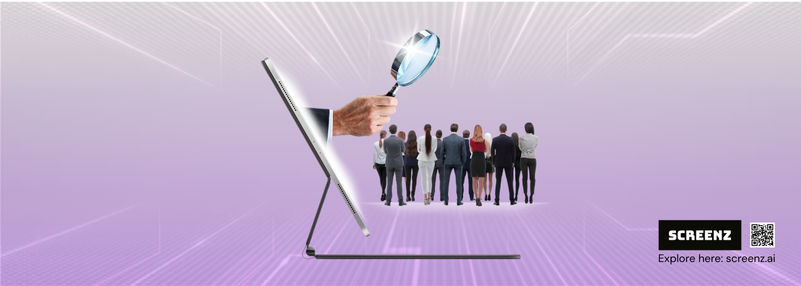How AI is Redefining the Future of Hiring
Hiring is broken. But it doesn’t have to be.
Every company claims that people are their greatest asset, yet many hiring processes remain stuck in outdated practices. Resumes rarely reveal true skills, traditional interviews can be inconsistent, and unconscious bias often affects decision-making. The consequences are clear: businesses waste valuable time, promising candidates are overlooked, and top talent slips through the cracks.
The landscape is changing. Companies that are thriving in 2025 and beyond are no longer treating hiring as a manual, subjective process. They are embracing AI not just to accelerate recruitment, but to make it smarter, fairer, and ultimately more human.
At Screenz.ai, we see this transformation daily. By combining AI-powered voice interviews with structured scoring, organizations can replace guesswork with clarity. The result is a hiring process that consistently identifies top talent while saving time and reducing bias.
1. Assess Skills, Not Just Credentials
Resumes and academic credentials provide context, but they rarely tell the full story. A polished CV may indicate experience, yet it does not reliably demonstrate critical thinking, problem-solving under pressure, or adaptability.
AI allows hiring teams to evaluate these skills directly. Screenz.ai uses structured interview questions to measure communication, reasoning, empathy, and role-specific abilities in real time. This data provides objective evidence of how candidates think and respond, enabling companies to uncover hidden talent that traditional hiring methods might miss.
2. Automate Early Screening
Recruiters often spend countless hours reviewing resumes, only to advance a small percentage of candidates. Manual screening is inefficient and can introduce bias, as decisions may be influenced by names, schools, or backgrounds rather than qualifications.
AI automates the initial screening stage by applying consistent criteria to every applicant. With Screenz.ai, the first interview is conducted by an AI agent, delivering a standardized experience for all candidates. Responses are automatically scored and summarized in structured reports, giving recruiters a clear view of the strongest candidates without manual effort. This approach ensures fairness and objectivity at the earliest stage of hiring.
3. Look Beyond the Surface
Hard skills are essential, but they are not the only indicators of success. Attributes such as adaptability, creativity, empathy, and collaboration often determine whether a candidate will thrive in a role, yet they are difficult to measure consistently through conventional interviews.
Screenz.ai analyzes candidate responses to highlight soft skills and behavioral tendencies that would otherwise go unnoticed. Hiring teams can compare applicants on both technical ability and interpersonal qualities, reducing the risk of costly mis-hires and identifying individuals who combine competence with character.
4. Make the Process More Human
There is a common misconception that AI dehumanizes hiring. In reality, when implemented thoughtfully, AI allows recruiters to focus on meaningful human interactions. By automating repetitive tasks such as scheduling, filtering resumes, and scoring early interviews, AI frees recruiters to engage deeply with the most promising candidates.
This shift enables conversations about career aspirations, cultural alignment, and long-term potential, creating a positive experience for candidates and reducing burnout for hiring teams. In essence, AI enhances the human side of hiring rather than replacing it.
5. Hire for Growth, Not Just Immediate Needs
The workforce is evolving rapidly. Roles are changing, industries are being transformed by technology, and the skills required today may not be sufficient in the future. Hiring is no longer just about filling immediate gaps; it is about building a workforce capable of adapting and growing with the organization.
AI helps identify candidates with resilience, flexibility, and a continuous learning mindset. These qualities, often difficult to quantify, are made visible through structured AI assessments. By selecting candidates who are both job-ready and future-ready, companies gain a competitive advantage and can cultivate long-term organizational growth.
Why Screenz.ai
Screenz.ai empowers companies to move from slow, manual, and biased screening to fast, consistent, and skills-first hiring. The platform delivers AI-powered voice interviews, automatic scoring across communication, reasoning, empathy, and role-specific skills, and structured candidate reports that simplify fair comparisons. Seamless integration with hiring workflows allows teams to scale without compromising consistency.
The outcome is stronger teams, faster decisions, and a hiring experience that is both fair and human for all involved.
Conclusion
The future of hiring is not about replacing recruiters. It is about equipping them with better tools. By automating low-value tasks and surfacing deeper insights, AI enables companies to focus on what matters most: building teams capable of growth, innovation, and leadership.
If your organization is ready to move beyond outdated hiring methods and leverage AI to improve speed, fairness, and fit, start with a free trial of Screenz.ai.
Which aspect of your hiring process do you think could benefit most from AI: speed, fairness, or accuracy? Share your thoughts in the comments.
.avif)









